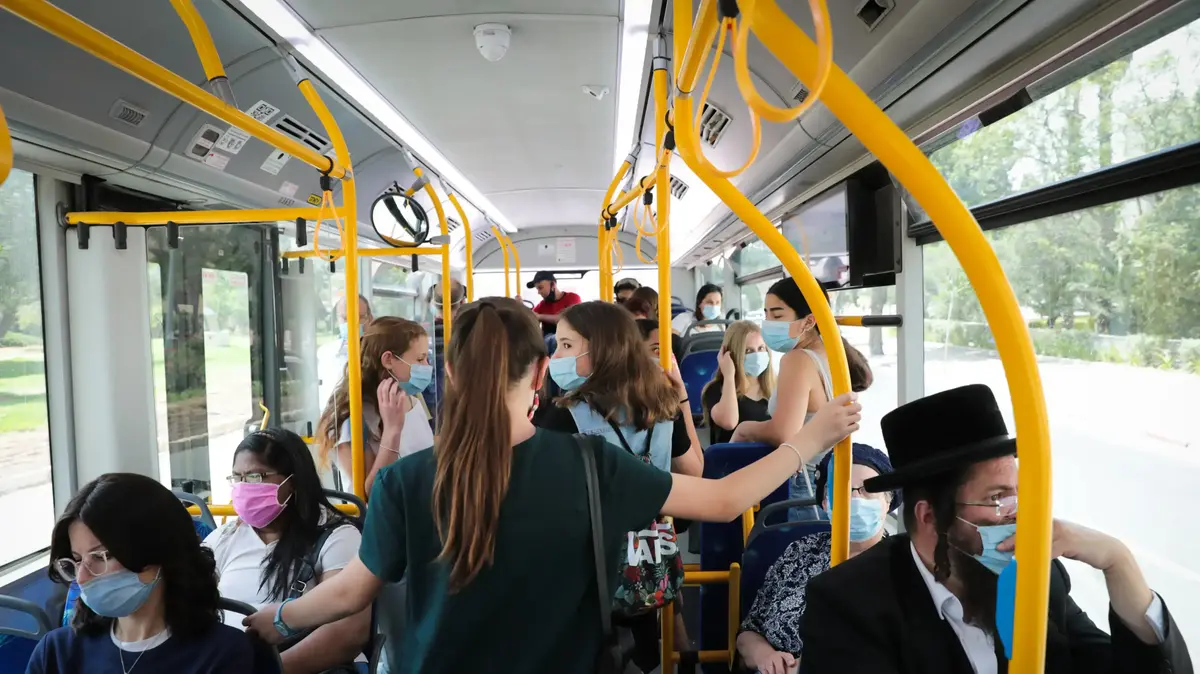Bad smells, overcrowding and noise: What makes the lives of passengers on public transport bitter?
While the Department of Transportation strives to persuade citizens to leave the vehicle at home, a passenger survey reveals a grim reality on buses.
While many report terrible overcrowding, older travelers complain about not being careful about wearing masks.
Despite the hazards, most passengers completely refrained from commenting to others while traveling
Keenan Cohen
03/04/2022
Sunday, 03 April 2022, 11:21
Share on Facebook
Share on WhatsApp
Share on Twitter
Share on Email
Share on general
Comments
Comments
In the video: Load density and delays due to disruptions at Tel Aviv train stations, February 10, 2022 (Yifat Rosenberg)
Overcrowding, noisy passengers and a lack of care about wearing masks are the most disturbing factors for passengers on public transportation in Gush Dan, according to a survey conducted by Moovit, which examined the issue.
The sad reality emerging from the survey may explain why in the face of billions of investments, budget shifts and the glittering vision of the Ministry of Transport, many citizens still prefer to use the private car when traveling to work.
More on Walla!
Improvised prayer carriages on the train, "ushers" prevent women from entering
15 train stations shut down, the south remains cut off from the center: "It will take many more hours until treatment"
Come get stronger, sculpt and change your life in 10 sessions
Passengers fear noise and overcrowding.
Buses (Photo: Flash 90, Yossi Zamir, Flash 90)
Public Transport Survey
In a survey conducted by the company responsible for the popular public transport widget, passengers were asked to specify which factors most hinder them from enjoying the trip.
The structure of the survey, the results of which reached us, allowed passengers to choose up to three options from a list presented to them.
The most disturbing factor, chosen by 60.1% of survey participants, is bus congestion.
Another benefit factor noted by many of the participants is the lack of care in wearing the masks - an acute problem during the corona period (40.8%).
Another answer many chose was “noisy passengers” (34.7% of respondents).
The list also mentioned dirt on the buses (28.4%), inappropriate driver behavior (27.4%), unpleasant odors (25.9%), passengers putting their feet on the seats (18.6%) and complaints about bus temperatures - either too hot or too cold ( 17.6% and 11.4% respectively).
The last two places in the survey were occupied by complaints about noisy radio (9.4%) and an inaccessible bus (9.1%).
The new central station in Tel Aviv (Photo: Reuven Castro)
Segmented by age, it can be seen that the phenomenon of density disturbs all age groups, with up to the age of 45 being the leader by a large gap.
In older passengers, the lack of masks is the most disruptive factor.
Young passengers specifically noted driver behavior and bus temperature.
More on Walla!
What will make it better, and where will you be more satisfied with it?
The Great Public Transport Survey
To the full article
The survey also asked the passengers what actions they took in the face of the interfering factors during the trip.
While regarding density there is not much to do, when asked about their comments in the other sections, most survey respondents said they refrain from commenting (68.7%).
Of those who did comment, 16.7% testified that other passengers reacted unpleasantly to the comment, 7.9% commented and did not receive a response and only 6.7% indicated that following the comment the passenger changed the disruptive behavior.
In addition, with the address of the complaint being the driver, the percentage of commenters is even smaller - 76.7% of passengers refrained from commenting to him.
10.3% of those who did comment stated that nothing happened following their comment, 5.2% said the driver tried to help, and in 7.9% of cases the driver reacted unpleasantly.
news
News in Israel
Society and welfare
Tags
Public Transport
Buses
Mobit










/cloudfront-eu-central-1.images.arcpublishing.com/prisa/KMEYMJKESBAZBE4MRBAM4TGHIQ.jpg)


